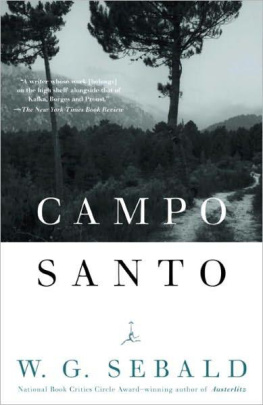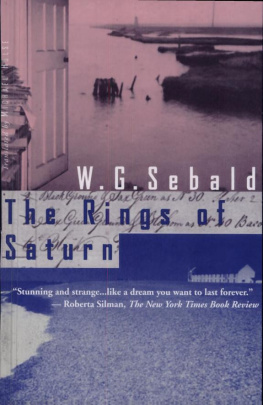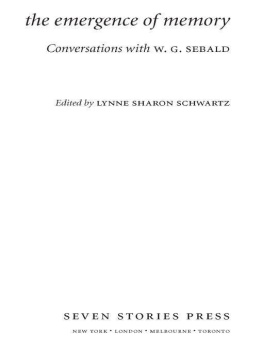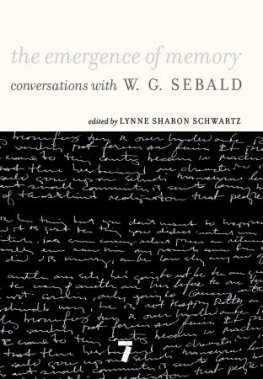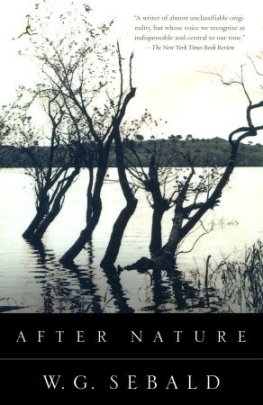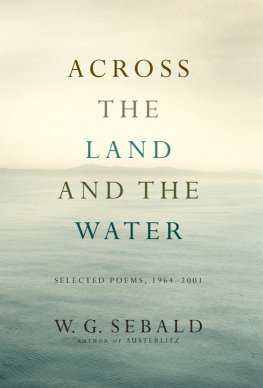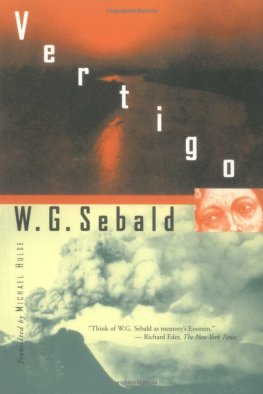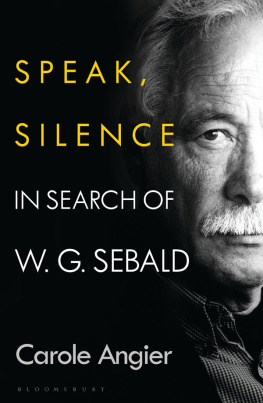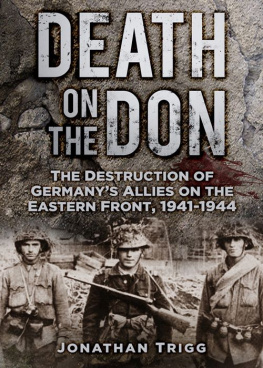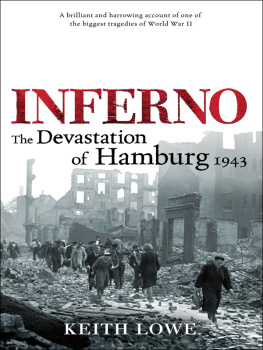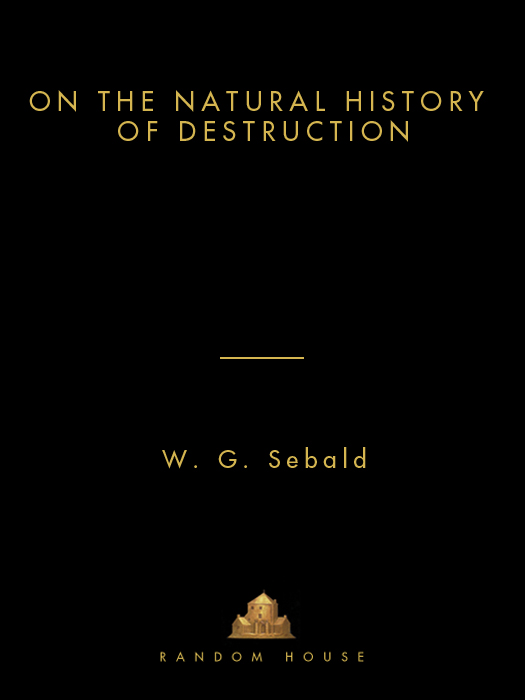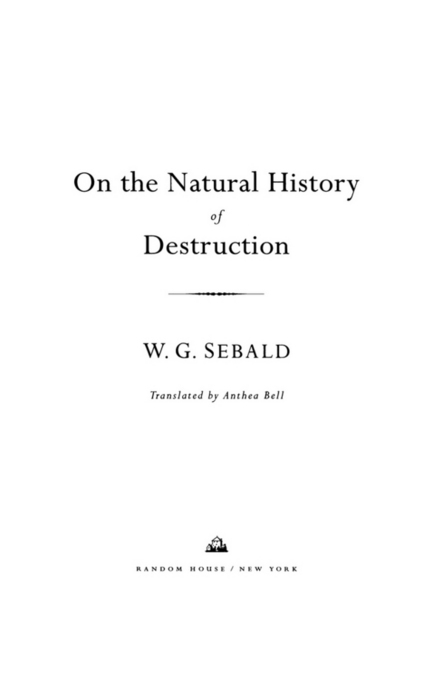Translation copyright 2003 by Anthea Bell
All rights reserved under International and Pan-American Copyright Conventions. Published in the United States by Random House, Inc., New York.
R ANDOM H OUSE and colophon are registered trademarks of Random House, Inc.
This work was originally published in German by Hanser as Luftkrieg und Literatur in 1999 and in slightly different form. Copyright 1999 by W. G. Sebald. English translation published by arrangement with Hamish Hamilton, a publishing division of Penguin Books Ltd.
Grateful acknowledgment is made to Indiana University Press for permission to reprint excerpts from At the Minds Limits by Jean Amry, translated by Sidney Rosenfeld and Stella P. Rosenfeld. Translation copyright 1980 by Indiana University Press. Reprinted by permission of Indiana University Press.
Library of Congress Cataloging-in-Publication Data
Sebald, Winfried Georg, 19442001
[Luftkrieg und Literatur. English]
On the natural history of destruction: with essays on Alfred Andersch, Jean Amry, and Peter Weiss / W. G. Sebald; translated by Anthea Bell.
p. cm.
eISBN: 978-1-58836-276-6
1. World War, 19391945Literature and the war. 2. German literature20th centuryHistory and criticism. 3. Bombing, AerialGermany. 4. World War, 19391945Destruction and pillageGermany. I. Title.
PT405.S4313 2003 833.91409358dc21 2002075187
Random House website address: www.atrandom.com
v3.1_r1
Contents
A IR W AR AND L ITERATURE
Zrich Lectures
B ETWEEN THE D EVIL AND THE D EEP B LUE S EA
On Alfred Andersch
A GAINST THE I RREVERSIBLE
On Jean Amry
T HE R EMORSE OF THE H EART
On Memory and Cruelty in the Work of Peter Weiss
Foreword
T he lectures on literature and the air raids of the Second World War in this volume are not printed exactly as I delivered them in the late autumn of 1997. The idea behind the first lecture came from Carl Seeligs account of an excursion he made in the summer of 1943 with Robert Walser, then a patient in a mental hospital, on the very day before the night when the city of Hamburg went up in flames. Seeligs reminiscences, which make no reference at all to this coincidence, gave me a clearer view of the perspective from which I myself look back on the terrible events of those years. Born in a village in the Allgu Alps in May 1944, I am one of those who remained almost untouched by the catastrophe then unfolding in the German Reich. In my first Zrich lecture I tried to show, through passages of some length taken from my own literary works, that this catastrophe had nonetheless left its mark on my mind. On that occasion, such an approach could be justified, since the ostensible subject of my lectures was poetics. In the version presented here, however, extensive self-quotation would be inappropriate. I have therefore merely used parts of my first lecture in a postscript, which also deals with the reactions to what I said in Zrich and the correspondence that I subsequently received. Much of the response was rather bizarre in character. However, the inadequate and inhibited nature of the letters and other writings sent to me showed, in itself, that the sense of unparalleled national humiliation felt by millions in the last years of the war had never really found verbal expression, and that those directly affected by the experience neither shared it with each other nor passed it on to the next generation. The recurrent complaint that no one, to the present day, has written the great German epic of the wartime and postwar periods is not unconnected with this failure (which in some ways is entirely understandable), given the force of the absolute uncertainty that emerged from our order-loving minds. In spite of strenuous efforts to come to terms with the past, as people like to put it, it seems to me that we Germans today are a nation strikingly blind to history and lacking in tradition. We do not feel any passionate interest in our earlier way of life and the specific features of our own civilization, of the kind universally perceptible, for instance, in the culture of the British Isles. And when we turn to take a retrospective view, particularly of the years 1930 to 1950, we are always looking and looking away at the same time. As a result, the works produced by German authors after the war are often marked by a half-consciousness or false consciousness designed to consolidate the extremely precarious position of those writers in a society that was morally almost entirely discredited. To the overwhelming majority of the writers who stayed on in Germany under the Third Reich, the redefinition of their idea of themselves after 1945 was a more urgent business than depiction of the real conditions surrounding them. The case of Alfred Andersch was a good example of the unfortunate consequences in literary practice, and for that reason the essay on him which I published in Lettre a few years ago is reprinted here, after the lectures on air war and literature. At the time it earned me several sharp reprimands from people unwilling to see that, as the apparently inexorable power of the Fascist regime was deployed, a basic stance of opposition and a lively intelligence, characteristics undoubtedly typical of Andersch, could easily turn into more or less deliberate attempts to conform, and that later a man in the public eye, like Andersch, would therefore have to adjust his presentation of his career, through tactful omissions and other revisions. In my view, such a preoccupation with retrospective improvement of the self-image they wished to hand down was one of the main reasons for the inability of a whole generation of German authors to describe what they had seen, and to convey it to our minds.
Translators note: This is the foreword as written for the German edition of the book published by Hanser in 1999. The English edition, it will be seen, also includes essays on Jean Amry and Peter Weiss, which were not part of the original German publication. I have no doubt that if he had lived to see the final text of the full translationhe had already approved the whole of the earlier partW. G. Sebald would have revised or added to the foreword in order to include mention of those two authors.
Air War and Literature
 Zrich Lectures
Zrich LecturesTHE TRICK OF ELIMINATION IS EVERY EXPERTS DEFENSIVE REFLEX .
Stanisaw Lem, Imaginary Magnitude
I
T oday it is hard to form an even partly adequate idea of the extent of the devastation suffered by the cities of Germany in the last years of the Second World War, still harder to think about the horrors involved in that devastation. It is true that the strategic bombing surveys published by the Allies, together with the records of the Federal German Statistics Office and other official sources, show that the Royal Air Force alone dropped a million tons of bombs on enemy territory; it is true that of the 131 towns and cities attacked, some only once and some repeatedly, many were almost entirely flattened, that about 600,000 German civilians fell victim to the air raids, and that three and a half million homes were destroyed, while at the end of the war seven and a Brunswick, and Wrzburg, a historical burden ultimately regretted by only a few. And in addition to these more or less identifiable factors in the genesis of the economic miracle, there was also a purely immaterial catalyst: the stream of psychic energy that has not dried up to this day, and which has its source in the well-kept secret of the corpses built into the foundations of our state, a secret that bound all Germans together in the postwar years, and indeed still binds them, more closely than any positive goal such as the realization of democracy ever could. Perhaps we ought to remind ourselves of that context now, when the project of creating a greater Europe, a project that has already failed twice, is entering a new phase, and the sphere of influence of the Deutschmarkhistory has a way of repeating itselfseems to extend almost precisely to the confines of the area occupied by the Wehrmacht in the year 1941.


